What's behind the vehemence of the anti-NFL sentiment? Two basic factors are at play -- one that is the league's fault and one that is unrelated to the NFL. Let's start with what is the league's fault.
What is the league's fault is that the chickens are coming home to roost. Over and over, the NFL and its owners have acted in an arrogant manner. From demanding public subsidies to demanding special favors to demanding Supreme Court hearings they lose 9-0 to thumbing their noses at health harm to players and the children who emulate those players, the NFL's owners have been a spoiled, selfish group.
The result is they have no reserve of goodwill to fall back on when times are tough. If the NFL's owners were beloved -- or perceived as playing positive roles in their communities -- they would have a reserve of public goodwill. They have none. Now that it's open season on the NFL, everyone who dislikes football has a chance to express that sentiment.
Some people don't like the outsize role football plays in American politics and urban development. Some think a violent game should not be the United States' national sport. Some think football has become the eggplant that eats the budget of big public universities or is accorded too much importance at high schools. Some people are angry with how the super-rich owners of the NFL wallow in subsides while restricting health care assistance to former players and are happy to have cheerleaders dance half-naked but refuse to pay them minimum wage, let alone treat them fairly. And some people simply can't stand that blaring inanity from football drowns out conversation at family gatherings at Thanksgiving and through the December holidays. If you don't like football or its supercilious owners, in September 2014, your turn came.
Consider how Roger Goodell -- depicted just two years ago on the cover of Time as a great reformer -- was treated at his Friday press conference. Rachel Nichols, a sports reporter for CNN and Turner Sports, ripped into Goodell about the league's retaining an "independent" law firm that is riddled with conflicts of interest, including that the president of the Ravens worked there for 31 years. "Why hire someone with even the appearance of impropriety, and how do you expect this to affect everything?" Goodell weakly responded, "You are questioning the integrity of the director of the FBI." Goodell meant the former FBI director, not the current director. At any rate, Nichols was not questioning the integrity of the former director of the FBI -- she was questioning the integrity of the NFL. That the league stumbled so badly in hiring a firm certain to be perceived as engaged in a whitewash shows the ground has shifted. In the past, the NFL could solve a problem by paying a distinguished person, such as former FBI director Robert Mueller, to tell the public what to believe. The days of the NFL telling the public what to believe are over.
Judy Battista, who works for NFL.com, the official site of the National Football League, was openly hostile to Goodell and then followed up with a snarky piece that declared, "The policy that has been the signature of his tenure is badly broken, wildly nonspecific and almost certainly contributed to the misjudgments and mishandlings that have accompanied the investigation and discipline for Ray Rice."
It's one thing when The Huffington Post is hammering the NFL. It's quite another when hardcore sports lovers are angry with the league. The chickens have come home to roost, and the NFL has only itself to blame.
But what about the second factor, for which the league should not be assailed? As the most important sport in the most important nation, the NFL holds up a mirror to American society. What we see in the reflection is not an athletic organization but ourselves.
Just five years ago, the fact that football causes neurological harm was a forbidden topic. Not only would the NFL not talk about it, but high-school coaches and principals also wouldn't talk about it. When concussions came out of the closet as an issue of concern, anger was expressed at NFL indifference. But we were really angry at ourselves. How many youth and high-school coaches, how many teachers and trainers and physicians and nurses, had seen football cause head harm and done nothing? When the sociology of sports head injuries began to shift, the NFL absorbed the ire really due to society as a whole.
This past year, there was a huge conundrum regarding the bullying of Jonathan Martin in the Miami Dolphins' locker room. A generation ago, the notion that a muscular, 300-pound man was being bullied would have caused people to laugh. But society's view of bullying has shifted. Bullying is no longer seen as just bad manners; it is now an ethical or even legal question. The NFL was the mirror for that social change.
When an openly gay player was drafted by the St. Louis Rams, the NFL became the mirror in which the issue of prejudice against gays was reflected. With Ray Rice, the NFL has become the mirror in which we see society's changing attitude regarding domestic violence -- that it should no longer be hushed up. A generation ago -- a year ago! -- it would have seemed impossible that pro football could become a women's issue. What's happened is a reflection of larger shifts within society.
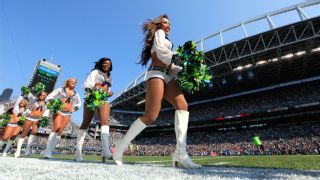
So if you think the NFL is too big for its britches, now is your moment. Fire away with both barrels because no one should have sympathy for Goodell or the league's owners. But bear in mind, American society projects onto the NFL questions that have nothing to do with sports that it is trying to work out.
In competition news, what a game at Seattle! The Seahawks and Broncos played the contest football enthusiasts had longed for at the Super Bowl. Despite scoring just 11 points in seven quarters against the Seattle defense, Denver did not lose heart in the eighth quarter. Instead, they scored three times and staged an incredible, length-of-the-field, buzzer-beater drive in just 41 seconds -- without a timeout. Everything the Broncos have learned about extremely fast football came together on that drive, and if Denver did not prevail, at least its players got their pride back. It sure was quiet in that loud stadium.
Still, many of the Broncos' choices were puzzling. At the Super Bowl, Denver kept trying to throw sideways against the Hawks' press coverage. Your columnist noted, "Denver didn't try to move the ball down the field until the contest was out of hand -- the Broncs' longest first-half gain was 19 yards." Rinse and repeat at Seattle: Lots of super-short passes and nothing deep in the first half. Even as the Broncos were reaching panic time in the fourth quarter, they kept throwing hitches for no gain.
For a guy who runs a pass-wacky, high-tech offense, Denver coach John Fox sure is conservative. Taking possession down 17-3 with 12 seconds remaining in the first half and all three timeouts, Fox had his charges kneel. Why not try one long pass and then, if it works, call time?
Later, Fox had the Broncos punt on fourth-and-5 near midfield in the fourth quarter, when they were down 12 points. What use is pro football history's most prolific offense if you are afraid to go for it on fourth-and-5 while trailing big in the fourth quarter? Worse, trailing by 14 points in the third quarter, Fox had the Broncos kick on fourth-and-1 from their 42. In the annals of what this column calls Preposterous Punts, that one gets an honored place.
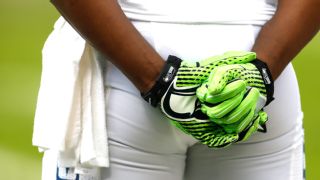
Denver has played two of its past four games that counted versus Seattle, and both were far from Colorado home-altitude advantage. In both contests, the Broncos committed a turnover on their first offensive snap; in both, Peyton Manning threw a key interception directly into the hands of Kam Chancellor. Since the start of the 2013 season, the Broncos are 0-2 versus the Seahawks and 17-3 versus all other teams. One suspects that if Denver never sees the Hawks' green-kryptonite gloves again, it will be too soon.
As the for Bluish Men Group, their leader, Russell Wilson, is now 8-0 in starts against Super Bowl-winning quarterbacks -- Tom Brady, Drew Brees, the Manning brothers and Aaron Rodgers. Of course, football is a team game, so this stat mainly tells us the Seahawks are really good. But if individual statistics did not matter, no one would care who the league's leading rusher is. Wilson 8-0 versus Super Bowl winners is quite something.
The Broncos and Seahawks now both get a bye week. They earned it!
Stat Of The Week No. 1: The Detroit defense (nine points) outscored the Green Bay offense (seven points).
Stat Of The Week No. 2: Since taking a 17-0 lead in its opener, Jacksonville has been outscored 119-27.
Stat Of The Week No. 3: Since becoming the Eagles' starter under Chip Kelly, Nick Foles has thrown 32 touchdown passes and four interceptions.
Stat Of The Week No. 4: The NFL's passer rating system reaches perfection at a maximum of 158.3, while if every attempt a quarterback throws falls incomplete, he gets a 39. In the Buccaneers-Falcons game, Matt Ryan had a 155.9 rating and Josh McCown a 22.2 rating.
Stat Of The Week No. 5: The Cardinals, who blocked a field goal at a key juncture versus Santa Clara, have blocked 17 field goals since 2008, most in the league in that span.
Stat Of The Week No. 6: The Bengals are on an 11-0 regular season home streak and an 0-3 postseason home streak.
Stat Of The Week No. 7: The Raiders are on a 2-16 road streak.
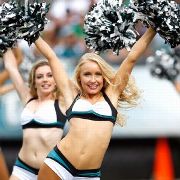
Stat Of The Week No. 8: In three games, the Eagles have fallen behind by combined 13-54, then outscored opponents by a combined 88-24.
Stat Of The Week No. 9: In NCAA play, Wisconsin outrushed Bowling Green by 551 yards.
Stat Of The Week No. 10: Since the start of the 2013 season, the Broncos have averaged 14 points a game versus the Seahawks and 36 points a game versus all other teams.
Sweet Play of the Week: Your columnist loves the tactic of bringing in a guy who never gets the ball and sending him deep. Leading Minnesota 7-0, the Saints faced second-and-5 on the Vikes' 34. Backup tight end Josh Hill, with seven receptions in two seasons, lined up right. Drew Brees looked left, looked left, pumped left -- and then threw deep right to Hill, who ran uncovered for the touchdown. Sweet.
Sour Play of the Week: Cincinnati quarterback Andy Dalton -- unbeatable at home during the regular season, but please don't mention the postseason -- was a prep player at Katy High School, the epicenter of Texas high school football culture. A favorite Texas prep gadget play is the "gunslinger." In it, the quarterback hands off, then drifts into the flat while the action goes in the other direction, and then the runner stops and throws back to the quarterback. Against Tennessee, Dalton caught an 18-yard touchdown pass from wide receiver Mohamed Sanu on a gunslinger. The play was sour for the Flaming Thumbtacks, whose cornerback, Blidi Wreh-Wilson, had what appeared to be an easy tackle on Dalton as the pass was caught and bounced off him. Normally, defenders crave the moment when a quarterback is a runner or receiver because taking a shot is legal. Instead, Wreh-Wilson appeared to pull up.
Sweet 'N' Sour Play: With Green Bay at Detroit tied at seven in the second quarter, the hosts faced third-and-long at midfield. Matt Stafford's deep pass was intercepted by the Packers' Davon House, who tumbled into the end zone for a touchback. Sweet!
No, wait. Sour for Green Bay because on replay the spot was reversed, and House was ruled down at the Packers' 1. That made the result of the play the same as a perfect coffin-corner punt. On the next Green Bay snap, Detroit's DeAndre Levy shot a gap unblocked and dropped Packers' running back Eddie Lacy three yards deep in the end zone for a safety. Green Bay free kicked, and the Detroit possession ended with a field goal. The Packers' interception turned into five points for Detroit. Green Bay would have been better off had House simply swatted the ball down for an incompletion.
Torture Works Better On TV Than In Real Life: This past winter, Dick Wolf, producer of the relentlessly middlebrow Law & Order primetime franchise, rolled out a show, Chicago P.D., that was intended to establish his artistic chops. The protagonist is a morally complex antihero, a detective who is on the take but who also defends the helpless and dispossessed. Outdoor scenes are shot on location, and no city photographs more artistically than Chicago -- winter scenes in snow are movie-quality cinematography. A nice inside joke is that characters have Chicago street names: Detective Halstead, Lieutenant Belden. The 2014 season premiere is Wednesday.
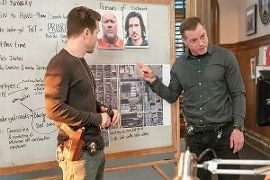
NBC promotes Chicago P.D. by implying it shows the gritty, realistic truth of urban police work, much as the network promoted Hill Street Blues a generation ago. But Chicago P.D. isn't vaguely realistic. The 15-episode first season depicted half-dozen machine-gun battles on Chicago streets. Gunfire is distressingly common in Chicago, but nothing like what the show presents. Mass murders, explosions and jailbreaks are presented as everyday events in the Windy City. A dozen cops have been gunned down in the series so far; that's more than the total killed on-duty by gunfire in actual during the current decade. (Look on the left for Chicago; the right is the national figure.) Officers on Chicago P.D. obtain in minutes the sort of information that takes real law enforcement months to compile. A detective barks, "Get me a list of all gang-affiliated males in this neighborhood." A moment later, she's holding the info.
The antihero protagonist is said to have been in prison for corruption but released "by order of the police chief." This really is not how the justice system works. Then a cop-killer also is released "by order of the police chief," which sets up a plot arc in which the good guys seek vengeance. In the real Chicago -- or any big city -- a convicted cop-killer would never see sunlight again.
Okay, it's television. But what's disturbing about Chicago P.D. is audiences are manipulated to think torture is a regrettable necessity for protecting the public. Three times in the first season, the antihero tortures suspects -- a severe beating and threats to cut off an ear and shove a hand down a running garbage disposal. Each time, torture immediately results in information that saves innocent lives. Each time, viewers know, from prior scenes, the antihero caught the right man. That manipulates the viewer into thinking, "He deserves whatever he gets."
In the real world, law enforcement officers rarely are sure whether they caught the right person or what a prisoner might know. Some ethicists say there could be a ticking-bomb exception -- if the prisoner could reveal where a ticking bomb is, then torture becomes permissible. But how could a law enforcement officer be sure what a captive knows? And if by this logic torture is permissible, wouldn't that justify torture by, say, the Taliban if they captured a U.S. airman who could know the location of a planned drone strike?
NBC executives don't want to live in a country where police have the green light to torture suspects. So why do they extol on primetime the notion that torture by the police saves lives? Don't say to make the show realistic. Nothing about "Chicago P.D." is realistic -- except the scenery.

Silicon Valley Goes To Outer Space: NASA decided this past week to have Boeing and SpaceX, an Elon Musk company, cooperate on a new system for taking astronauts to and from low-Earth orbit -- throwaway rockets topped by a capsule, just like in the 1960s. Boeing then said it would team with Blue Origin, a Jeff Bezos startup, to engineer a new rocket motor to replace an engine currently purchased from a Russian aeronautics firm. Beyond the fact that these initiatives seem to be Silicon Valley planning to leave Earth behind, they have been described in the press as a NASA decision to let private enterprise build its hardware. NASA hardware has always been privately manufactured -- Chrysler built the Saturn I-B, forerunner to the Saturn V moon rocket, which was built by a consortium with Boeing building the rocket's first stage. The past week's deals only mean Boeing, SpaceX and Blue Origins will have more management authority over space designs than was the case with past projects.
The key question is whether the new project will bring down the cost of access to orbit. Many past initiatives -- the space shuttle, the Air Force's Evolved Expendable Launch Vehicle, others -- promised lower cost, then turned out to be more expensive than systems they replaced. Musk says his technology is cheaper than anything proposed by the old-boys' aerospace network. Now is his chance to prove it. Currently NASA outsources manned launches to Russia, which charges $71 million per seat to the space station. That price needs to fall substantially for use of outer space to be practical and for the past week's announcements to be justified.
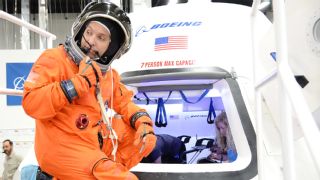
In inking the deals, NASA Administrator Charles Bolden said they free his agency to "focus on an even more ambitious mission -- that of sending humans to Mars." Well, at least NASA wants to send humans, not Klingons or Cardassians. But with current technology, the notion of going to Mars borders on crackpot.
Your columnist notes in the new Washington Monthly, "A pretty basic Mars mission would weigh about 4,000 tons at departure from low-Earth orbit. That's the mass of a Perry-class frigate, and the U.S. is not sending a frigate to Mars anytime soon. Putting those 4,000 tons into orbit would require the launching of 30 Saturn V-class rockets. The entire Apollo moon program entailed 12 Saturn V launches." A substantial propulsion breakthrough is required before a Mars mission can be considered.
TMQ likes that the new CST-100 space capsule designed by Boeing has a disclaimer above the hatch: 7 PERSON MAX CAPACITY. As if no mission controller would know this! Maybe Boeing is worried college students on a lark would try to jam too many people in.
Buck-Buck-Brawkkkkkk: Trailing 35-0 at Atlanta, the Buccaneers punted in Falcons territory. Just to prove it was no fluke, still trailing 35-0, the Bucs punted again in Falcons territory. Only when his charges trailed 56-0 did Lovie Smith roll the dice and successfully go for it on fourth down. His team eventually scored.
Buck-Buck-Brawkkkkkk (Vengeance of the Football Gods Edition): Down 17-0 in the third quarter at Jersey/A, Houston took a field goal on fourth-and-inches from the Giants' 9. Sure, a fourth down try by the Texans failed on the previous possession, but that was then, this is now! That a coin has come up tails 10 straight times tells nothing about what will happen on the 11th flip.
Now it's 17-3. Facing third-and-2 on the Moo Cows' 44, the Giants throw incomplete and are called for offensive pass interference. Bill O'Brien declines the penalty, confident Tom Coughlin will punt on fourth-and-2 in Houston territory, which Coughlin proceeds to do. Both coaches were in buck-buck-buck mode.
Now it's Jersey/A 20, Houston 10 in the fourth quarter. Facing fourth-and-1 on his own 36, O'Brien sends in the punt unit. You're down two scores in the fourth quarter and you need one yard -- why are you punting? At this point, the football gods had had enough and commanded the punt be blocked -- the decisive down of the host's victory.
Baltimore tried on fourth-and-1 early in the fourth quarter at Cleveland and failed, but the Ravens went on to victory, which shows sometimes it's better to try and fail, which tells players their coach is challenging them to win, not launch a kick.
Buck-Buck-Brawkkkkkk (International Edition): Reader Salman Mitha of Munich writes that in the first round of the German Football League playoffs, the underdog Munich Cowboys trailed the New Yorker Lions of Brunswick by 20 points in the second quarter and punted on fourth-and-1 from midfield. Mitha reports, "As the punt boomed, I wrote 'Spiel ist aus' in my notebook." Munich went on to lose by 41 points.
Concussion Watch: Does neurological damage caused by football make players more likely to engage in outburst behavior, including domestic violence? A retired Canadian neurosurgeon raises that disquieting possibility. Episodes of violent behavior have also been linked to use of bodybuilding drugs and narcotic painkillers, two issues the NFL claims it has under control but might not.
Declining Deficit Should Not Mean Rising Borrowing: The latest deficit news is all positive. Fiscal year 2014 will be the fifth straight in which the federal deficit has declined as a share of GDP. The deficit was 10.8 percent of GDP in Barack Obama's first year, a scary statistic. This year it will be 2.9 percent, below the four-decade average of 3.1 percent. Growth in the rate of health care spending is moderating. In 2006, the Congressional Budget Office thought federal spending per health care recipient would rise to $14,000 in 2014; instead this year's actual will be $11,500. Projections now call for a mild decline in federal health care spending: see Figure 1-4.
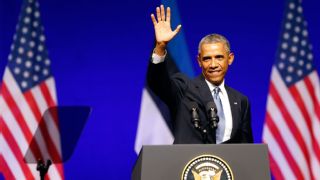
Presidents get too much blame when things go poorly and too much credit when they go well. But since Obama was blamed for the deluge of red ink, he should now be credited for an improved national fiscal picture. Since Obama was broadsided for saying ObamaCare would have a positive effect on health care spending, he should be praised now that federal health care costs are in fact moderating.
Here's the rub. All that's happening is decline of the rate at which national money problems accumulate. Debt is not being paid down. The same Congressional Budget Office study cited above shows a bleak long-term forecast. National debt held by the public (the serious kind, government-to-government debt means less) is $12.8 trillion; at the current pace, that will increase another $7.2 trillion in the coming decade. So a debt that's taken 225 years to get to where it is today will jump another 56 percent in just the next 10 years. That's the improved picture!
These numbers assume the Fed can maintain "zirp" -- zero interest rate policy. If zirp gets zapped, debt-service costs on federal borrowing will rise and red ink will run in rivers. Meanwhile, health care subsidies aren't vanishing, rather, ballooning more slowly than feared. The CBO projects that on the current course, by 2024 federal payments for Medicare, Medicaid and ObamaCare will exceed Social Security spending.
With national elections this year and in 2016, some candidates might campaign on a theme that sounds like this: The debt problem is fixed, so let's increase spending, especially, let's increase entitlement benefits. Sen. Elizabeth Warren, a possible presidential contender, already has said she thinks Social Security benefits should be increased. That would accelerate the rise of government debt; it seems Sen. Warren doesn't want to bankrupt the young in the future, she wants to bankrupt them right now! Sen. Tom Harkin of Iowa has said he favors increasing payroll taxes not to make Social Security more secure for the long run, but rather, to spend all new revenue immediately.
Reasoning "the federal deficit is declining so let's increase spending" is akin is reasoning "I finally have my credit card debt under control, so I'm going to get more credit cards!" But politicians love to hand out money that someone else will have to repay after they leave office. If Sen. Warren's position sets off a pandering contest on the part of 2016 White House aspirants, the nation's long-term fiscal position could get worse. That would harm average people, not the 1 percent. The rich won't be the ones to suffer if Social Security or Medicare becomes insolvent.
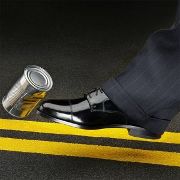
Those who favor more government spending tend to imply that current entitlements policy is penurious. Wondering if this is so, I looked up the amounts the federal government spent on major Depression-era programs -- the National Industrial Recovery Act and the 1935 Emergency Relief Act. These programs were most similar to the four stimulus bills during the Great Recession -- one under George W. Bush, three under Obama -- plus the TARP initiative and the Fannie/Freddie bailouts. I added up costs of the Depression-era bills, adjusted to current dollars and then multiplied by 2.5 to adjust to current population. (Since there are 2.5 times more Americans today, we'd expect federal programs to be 2.5 times as expensive.)
Result? Adjusted to current dollars and current population, the two big Depression programs cost $360 billion. The stimulus bills and the TARP initiative, subtracting for money repaid to the Treasury, plus the Fannie/Freddie bailouts subtracting for amounts repaid, cost about $1.4 trillion. That's almost four times as much federal relief spending for the Great Recession as for the Great Depression, which is looked back on as a time of unparalleled federal generosity.
During the Great Depression, there were no federal welfare, housing or disability benefits: no TANF, SNAP, CHIP, SSI, unemployment compensation, foster care, housing help or EITC, the "negative tax" that sends checks to the working poor who owe no income taxes. In 2014, spending for that laundry list of entitlement programs will be around $821 billion -- see Table 1-2. Once again adjusting to current dollars and correcting for population growth, that makes current federal entitlement programs for the poor, working poor and disabled about double, on an annual basis, the total cost of major Great Depression federal relief programs. And that's before ObamaCare subsidies -- a new entitlement benefit -- which the same chart shows are starting slowly at $17 billion in 2014, then building to $137 billion per year a decade from now.
Now factor in Social Security, which didn't exist until the tail end of the Depression, and Medicare, which didn't exist till 1966. They come to $1.3 trillion this year -- far more, adjusting to current dollars and current population, than big Depression-era federal emergency programs. Adding $821 billion and $1.3 trillion gets a current $2.1 trillion to help today's Americans with their money problems -- versus the adjusted $360 billion total to help Americans handle the Depression.
It's good that government aid to individuals is much greater today than in the past; no one should have to live as millions did during the Depression. The point is that today's federal spending for the poor, the working poor, the disabled and the retired is much more generous than commonly understood.
Nevertheless, you'll hear it said that Social Security benefits should be increased because there is no immediate emergency in this program. There isn't. But Social Security entails long-term planning. To say the program has no issues because there's money in the coffers right now is like signing a 30-year mortgage with only enough for the first year's payments and declaring that the mortgage is nothing to be concerned about.

When Obama took office, Social Security trustees said the system was funded through 2037. Now the year of reckoning is 2033, with the 75-year forecast requiring a 2.88 percent tax increase. That means payroll taxes for most Americans need to rise from the current 12.4 percent to 15.2 percent -- a new $1,500 annual tax on the median household. Now it looks like Social Security's disability fund (SSI) could fail as soon as 2016, while Medicare's hospital fund will fail by 2030.
Social Security's finances could be improved by lifting its tax cap -- currently, only the first $117,000 of earned income is subject to payroll taxes. But even this soak-the-rich option will cover only about half of Social Security's long-term deficit, as Brookings Institution fellow Bill Galston, who was domestic policy adviser in the Clinton White House, warned recently. Some other reduction, such as lower benefits or a lower cost of living adjustment, would still be required.
As for SSI, Treasury Secretary Jack Lew suggested its failure could be postponed by diverting revenue from the main Social Security fund. That kicks the can down the road -- more funny money today, worse debt later. In the last 15 years, adjusting for population growth, the number of Americans receiving SSI subsidies has risen 62 percent. It's inconceivable that occurrences of bona-fide disability grew 62 percent in just 15 years -- more generous entitlement formulas underlie the increase. Lew vaguely promised the administration would examine SSI eligibility formulas at some unspecified future time, while wanting more borrowing and spending now. If SSI begins to draw from main Social Security revenues, the 2033 day of reckoning will come sooner -- but in somebody else's administration.
"We're all Keynesians now" is the saying in public policy circles. Are we? John Maynard Keynes advocated government borrowing and deficit spending during periods of slack economy, a view now universally held by Western governments. Those same governments conveniently forget Keynes also said that when the economy recovered, spending should be pared back to pay down any debt previously incurred.
Both parties in Washington have gotten really good at the borrow-borrow-borrow part of Keynesian economics; neither wants to deal with the spending cuts part that should come into play now that growth has resumed and unemployment has fallen. If the 2016 election turns into a pandering contest, the future could be mortgaged.
Everything in this long item assumes longevity does not increase, so the retired don't demand benefits for a longer time. What if longevity increases? See my cover story in the new Atlantic Monthly.

Wacky Whisky Of The Week: Have a scotch to celebrate the land of the Scots remaining in the United Kingdom! Your columnist would not refuse a dram of Talisker, a delightful whisky. Hoping to break out from niche status to mainstream, the brand has been advertising a Talisker Storm variant that claims "a profound maritime character, with a warm welcome from the Hebridean Sea." So it's scotch whisky that smells like fish? Steer your ship clear of Talisker 25, whose 116 proof is close to grain alcohol.
The NFL Has No Shame: Last week, Sens. Maria Cantwell, D- Wash., and Cory Booker, D-N.J., introduced separate bills to strip NFL headquarters of its extremely bizarre tax-exempt status. Cantwell said she will withdraw her bill if the R*dsk*ns change their name; Booker said he wanted new revenue generated by ending the NFL's tax favor to be used for programs that combat violence against women. NFL headquarters should lose its tax-exempt status regardless of what happens to the Washington franchise name or to funding for women's programs.

In 2013, Sen. Tom Coburn, R-Okla., and Rep. Jason Chaffetz, R-Utah, introduced House and Senate companion bills aimed at ending the NFL tax favor. The bills never gained traction; neither Republican leadership nor Democrats showed interest. Members on both sides of the aisle seemed more concerned with not being perceived as offending the owners of the nearest NFL club than with protection of the public interest.
Now that the NFL has stumbled badly and it's open season on offending the owners, this dynamic might change. And the unexpected twist that the NFL has become a woman's issue might change the Democratic Party calculus.
The NFL defends its tax break -- which is perfectly legal, that's the whole problem! -- by noting that only headquarters is tax-exempt; individual clubs face corporate taxation. Congress's Joint Committee on Taxation estimated in 2013 that ending professional sports tax favors to the NFL and MLB -- the NBA has always paid its taxes -- would add about $10 million per year to federal revenue: Kristi Dosh has the details. Ten million dollars a year is not huge in the scheme of things, but not chicken feed either. With the U.S. median household income at around $55,000, thousands of Americans must be taxed to make up for NFL headquarters not paying its fair share.
Not That Politicians Have Any Shame: Last week, Minnesota Gov. Mark Dayton said he was "embarrassed" by the Vikings' handling of the Adrian Peterson mess. Why wasn't Gov. Dayton embarrassed by the fact that Minnesota and Minneapolis handed nearly $500 million of taxpayers' money to the Vikings' ownership family to build the new stadium from which those super-rich owners will keep nearly all the revenue? Socializing costs while privatizing profit is the single worst aspect of the American economy. That the NFL symbolizes this abuse is yet another reason people are angry at the league. That Minnesota, once a progressive-politics state, now symbolizes socialized cost and privatized profit ought to set progressives boiling.

A Plot Device That Cannot Die: Tonight ABC debuts "Forever," a series in which longevity has increased so much that there is a New York City medical examiner who is immortal. Not only does this continue the odd trend of medical examiners presented as prime-time heroes -- "NCIS," "Body Of Proof," "Rizzoli & Isles" and other shows -- it continues the odd prime-time trend of immortal New York City law enforcement officials. The 2008 Fox series "New Amsterdam" was about an immortal NYPD detective. Immortal -- until he was canceled! Immortality will end for "Forever" in the same manner.
Apparently in the show, whenever the hero dies, he comes back to life the next day. This was also the premise of the recent big-budget Tom Cruise movie "Edge of Tomorrow." Heroes forced to relive the same experiences = audiences forced to relive the same premises.
The Football Gods Chortled: Since fleeing the wonderfully romantic city of San Francisco for the office buildings and parking lots of Santa Clara, the 49ers are 1-2 and have scored just three points in the second half.

World Leaders Burn Fossil Fuels To Come To New York City To Denounce Burning Fossil Fuels: Today your columnist is in New York City, where President Barack Obama and heads of state from around the world will make speeches decrying climate change.
Sunday, a large number of people - organizers said 400,000, the New York Times said "throngs"; crowd estimates are notoriously fuzzy -- marched down the Avenue of the Americas on the same theme. Many were chanting for "climate justice," which means not greenhouse gas controls, but more U.S. aid to the developing world. Perhaps there should be: The 1997 book "A Half Penny on the Federal Dollar" by Michael O'Hanlon and Carol Graham argued that foreign aid works better than commonly assumed. As for climate change, your columnist once was a skeptic, then as the research got stronger switched sides and now supports greenhouse regulations. But climate justice? If the United States simply gives money to the developing world as a guilt payment, that could provide luxury living for government elites, but won't do anything regarding artificial global warming.
As the for heads of state, save time by regarding this generic speech: "I am outraged that climate change is destroying the planet and I demand that someone else take action!"
Best banner in the New York City march: BLAME ALBERTA.
Football And Taxes Note: Two weeks ago, TMQ excoriated the Hall of Fame for being tax-exempt yet extolling O.J. Simpson, who personifies violence against women. I said the Hall "sheltered $31 million" from taxation in the most recent year for which records are available. Several readers familiar with the nonprofit world, including Susan Denton of San Francisco, countered that I inaccurately characterized the Hall's balance sheet -- had it been a for-profit in the most recent year, it would have been taxed on about $1.4 million. So my number was wrong -- I should have said the Hall of Fame sheltered $1.4 million.
The point remains the same: Why should taxpayers subsidize a professional sports exhibit of any kind, much less one that adulates someone like Simpson? Corporate taxes on $1.4 million would be about $475,000 -- not huge in the scheme of things, but many dozens of average families must be taxed to cover that sum.
Michael Jordan, Devin Hester Meet To Swap Stories About Chicago: Versus City of Tampa, Devin Hester not only set the all-time record for return touchdowns but also played well at wide receiver. Hester had a catch for 25 yards and during a turnover, stripped the ball from a Bucs player and fell on the rock and cradled it, which is proper form. TMQ's NFC preview expressed dismay at Chicago's lack of interest in retaining Hester: "The Falcons benefit from the Bears' puzzling decision to show the door to Devin Hester ... the Windy City is known for its sports curses -- soon the Devin Hester Curse might be added."
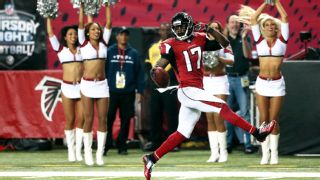
Hester ran a kick back for six for the Bears last season, so there was no reason to believe he was washed up. But the Bears seemed not to care about kick returns, in addition to not letting Hester play on offense, though he worked constantly to improve his route-running. Hester took no snaps for Chicago at wide receiver in 2013, and now already has three catches for more than 20 yards in his new home.
The Bears seemed actively anxious to get rid of Hester in the same odd way the Chicago Bulls once seemed actively anxious to get rid of Michael Jordan. What is it about Chicago and aging sports stars? If the Falcons make the playoffs this year and the Bears do not, the Devin Hester Curse will join the Shoeless Joe curse and the billy goat curse in Chicago lore. A huge embarrassment awaits Chicago management if Hester plays well when the Bears and Falcons meet on Oct. 12.
On the City of Tampa side, the first two Atlanta touchdowns went to receivers who were not covered by anyone at all -- what a smooth move by the Buccaneers' new management to waive Darrelle Revis in the offseason! City of Tampa's patchwork offensive line surrendered three sacks to the Falcons, who came in as the only NFL club without a sack. Waiving left tackle Donald Penn in the offseason -- that was a smooth move, too! The Bucs are on a 1-6 stretch at Atlanta and this one was painful to watch.
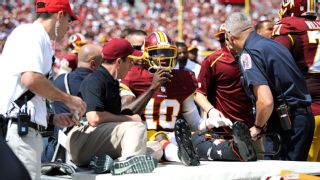
The King Is Dead, Long Live The King: Now that Kirk Cousins has taken RG III's job, will he also take his endorsement deals? Look for Cousins, wearing Adidas, to eat a Subway sandwich and drink Gatorade while driving a Nissan to purchase the latest EA Sports game.
Absurd Specificity Comes To NFL Fines: Last week the league fined Bruce Irvin of the Seahawks $8,268 for a late hit and Courtney Upshaw of the Ravens $16,537 for an illegal hit. Why wasn't Upshaw fined $16,537.95? The recent collective bargaining agreement spelled out fines with odd specificity, though the last digit was zero. Now NFL fines are sounding like wholesale prices of lumber shipments.
The 500 Club: Visiting BYU, UVA gained 519 yards, posted 19 more first downs than the Cougars, and lost. Hosting Old Dominion, Rice gained 526 yards, committed no turnovers, and lost. Visiting Yale, Lehigh gained 521 yards, posted a 21-0 lead, and lost. Hosting Eastern Washington, Montana State gained 547 yards, scored 51 points, had the lead and Eastern Washington facing fourth-and-10 in its territory with a minute remaining, and lost. Hosting No. 4 Oklahoma, West Virginia gained 513 yards, and lost. Visiting Arizona, Cal gained 573 yards, and lost. (There was a point in 2013 when Cal exceeded 500 yards in four of five games, and was 1-4 in that stretch.) Visiting Villanova, James Madison gained 568 yards, and lost by 18 points. Visiting Philadelphia, the Potomac Drainage Basin Indigenous Persons gained 511 yards, and lost.
This week's honorary members: Washington State, which posted 499 yards at home against Oregon, and lost. Missouri, which posted 498 yards at home against Indiana, and lost.
The 600 Club: Hosting Whitworth, University of La Verne gained 672 yards, and lost. Receiver John Lilly caught six touchdown passes for the Leopards, and this turned out not enough to win a modern college football contest.
Obscure College Score: Greensboro 37, La Grange 35. The Panthers joined The 500 Club by gaining 516 yards and losing. Located in La Grange, Georgia, La Grange College offers previews of previews.
Next Week: The NFL hires Paul Tagliabue to conduct an independent investigation of its "independent" investigation.

